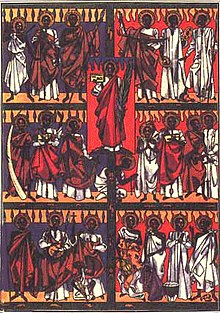Saint Charles Lwanga
| Charles Lwanga | |
|---|---|

St. Charles Lwanga and his companions
|
|
| Martyr | |
| Born |
1 January 1860 Kingdom of Buganda |
| Died | 3 June 1886 (aged 26) Namugongo, Kingdom of Buganda |
| Venerated in | Roman Catholic Church, Anglican Communion, Lutheranism |
| Beatified | 1920, Rome, Kingdom of Italy, by Pope Benedict XV |
| Canonized | 18 October 1964, Uganda, by Pope Paul VI |
| Major shrine | Basilica of the Uganda Martyrs, Munyonyo Martyrs Shrine |
| Feast | 3 June |
| Patronage | African Catholic Youth Action, converts, torture victims |
Charles Lwanga (Luganda: Kaloli Lwanga (1 January 1860 – 3 June 1886) was a Ugandan convert to the Catholic Church, who was martyred for his faith and is revered as a saint by both the Catholic Church and the Anglican Communion.
A member of the Baganda tribe, Lwanga was born in the Kingdom of Buganda, the central and southern part of modern Uganda, and served as chief of the royal pages and later major-domo in the court of King Mwanga II of Buganda. He was baptised by Pere Giraud on 15 November 1885.
As part of the king's effort to resist foreign colonization, the king insisted that Christian converts abandon their new faith and executed many Anglicans and Catholics between 1885 and 1887, including Lwanga and other officials in the royal court or otherwise very close to him.
The persecution started in 1885 after a massacre of Anglican missionaries, including Bishop James Hannington who was the leader of the Catholic community. Joseph Mukasa Balikuddembe, the major-domo of the court and a lay catechist, reproached the king for the killings, against which he had counseled him. Mwanga had Balikuddembe beheaded and arrested all of his followers on 15 November 1885. The king then ordered that Lwanga, who was chief page at that time, take up Mukasa's duties. That same day, Lwanga sought baptism as a Catholic by a missionary priest.
On 25 May 1886, Mwanga ordered a general assembly of the court while they were settled at Munyonyo, where he condemned two of the pages to death. The following morning, Lwanga secretly baptized those of his charges who were still only catechumens. Later that day, the king called a court assembly in which he interrogated all present to see if any would renounce Christianity. Led by Lwanga, the royal pages declared their fidelity to their religion, upon which the king condemned them to death, directing that they be marched to the traditional place of execution. Three of the prisoners, Pontian Ngondwe, Athanasius Bazzekuketta, and Gonzaga Gonza, were murdered on the march there.
...
Wikipedia
